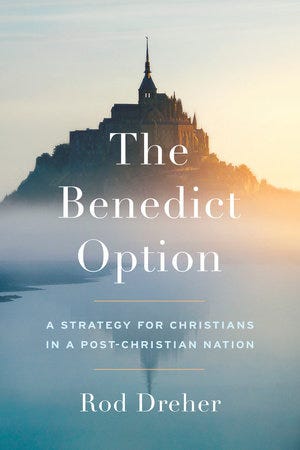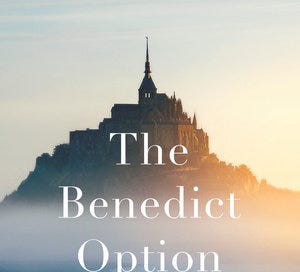
Review: The Benedict Option by Rob Dreher
Dreher, Rob. The Benedict Option: A Strategy for Christians in a Post-Christian Nation. New York: Sentinel, 2017. Pp. x + 262. ISBN 9780735213296. $29.98 CAN [Hardcover]. Source for Book Cover.

The Benedict Option may be one of the most important books of the next decade because it outlines a strategy for Christians to survive and thrive in a post-Christian culture. Dreher describes the Benedict Option with the iconic image of the Ark:
The image of the church as an Ark floating atop tempestuous waters of destruction is one of great antiquity in the history of the Christian faith. This iconic concept of the church's self-understanding must be recovered with vigor. (238)
The church is an ark that withstands the waves of a collapsing culture. Is is also a wellspring of life (238). The church must withstand the pressures of culture and also thrive on living waters. Argument According to Dreher, the church today needs to learn how the early church survived the fall of the Roman Empire. He highlights Saint Benedict's response to Rome's fall as an example for Christians today. Benedict wrote a rule or "a guide to living in Christian community" (15). By analogy to the fall of the Roman Empire, the West today is collapsing under attacks against "faith, the family, gender, and even what it means to be human" (17). Christians must respond not by fighting against the flood of opposition but by strategically retreating from it (12). Retreating does not mean giving up. "Rather than wasting energy and resources fighting un-winnable political battles," writers Dreher, "we should instead work on building communities, institutions, and networks of resistance that can outwit, outlast, and even eventually overcome the occupation" (12). The Benedict Option further explains how we got to where we are today and provides practical strategies for survival. Virtues The greatest virtue of The Benedict Option is its adroit cultural analysis and practical response to living in a post-Christian world. As a parent, Dreher has helped me to think through how I might want to raise my child in future and the strategies that I might use to ensure her ability flourish. Dreher also avoids falling into the traps of an overly confident idealism or an overly fearful description of the West. The Benedict Option does not promise success without any problems. It merely is an option to survive in the world in which we inhabit today. Dreher does not give into fear at where we are going. The fact that he proposes a strategy and does not merely describe the decline of the West means that he offers hope. Dreher has pioneered a distinctively Christian approach by resourcing the past. As a consequence, he probably has not sketched a perfect plan for us. But he has sketched a plan that is sourced in the Bible and in the Christian tradition. He has at least tried to provide a way to be Christian in the coming years. And we should commend him for this effort. Vices Dreher may underplay our ability to live in the world as Christians. One of his strategies is to send our children to classical Christian schools, and, if that is not possible, then he recommends homeschooling. I grant that these are two good options. But even today many public school districts will work with parents, and children are often able to live in two realities: the reality of Christian conviction and the reality of a secular age, which they will experience in public education. Dreher may also undervalue the role of the supernatural. What I mean by this is that even if Christians live in a hostile and confusing age, God will guide and protect them by his Spirit. In other words, the supernatural realm is something that we cannot forget when we consider what it might mean to live in a secular age. Cultural, political, and legal challenges may await us. But a Christian who is led by the Spirit of God will always remain strong, grounded in the faith. I am not, by this comment, screening out the possibility that the Spirit will lead the church corporately into a community of faith that is similar to what Dreher has sketched here. I am simply noting that Christians must not only strategize to thrive in the West, we must also trust in a higher power to protect and lead us. Conclusion Dreher's The Benedict Option should be read by all thoughtful Christians, not because he perfectly lays out a plan for survival but because he lays a plan at all. We need to engage with Dreher simply to gain the idea that we need to strategize, that we need to thoughtfully carry out our Christian faith in light of the West's decline. I hope that many take his central idea to heart, although I also hope that Christians will contextualize the Benedict Option to their regional contexts.
Note: Update on April 21, 2017. I received this book for free from the publisher in exchange for a review. But I was nor am under any obligation to provide a positive review.











